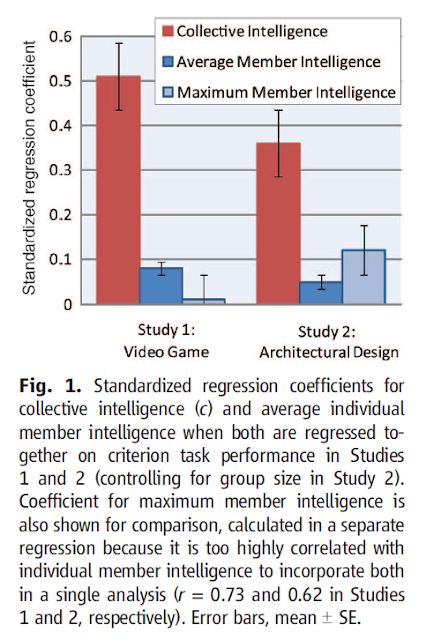"Collective Intelligence"
When Jonathan Plucker and coworkers wrote "Talent on the Sidelines: Excellence Gaps and America's Persistent Talent Underclass", they cautioned us, "One reasonable criticism of the 2010 study was our reliance on standardized test data at the national and state levels." Plucker and coworkers recognize that they are reducing the definition of excellence to proficiencies in math and reading. This indeed is a narrow view of education, but even with "a broader range of indicators — for example, 21st century skills or measures of creative productivity" as Plucker and coworkers have suggested, their view remains incomplete because it focuses on human performance at the individual level. This is a major problem because it is no secret that the current frontiers of human knowledge are multidisciplinary thereby requiring a number of viewpoints. Thus, with 21st century challenges, what we also need to look at is "collective intelligence".
We are very familiar with measures of individual intelligence and generally these measures do correlate with a wide variety of cognitive tasks. Wooley and coworkers in 2010 proposed that for a group, their was an analogous measure of "collective intelligence" that would likewise correlate with the performance of the group in a wide variety of tasks and challenges. And they did succeed by performing a well-designed experiment in demonstrating that there was indeed such a measure that could be regarded as "collective intelligence". This new measure appeared independent of the intelligence of the individual members as shown in one of their figures:
The tasks done by each group in this study "included solving visual puzzles, brainstorming, making collective moral judgments, and negotiating over limited resources". In the abstract of the paper, it was stated that this "collective intelligence" was found to correlate with "the average social sensitivity of group members, the equality in distribution of conversational turn-taking, and the proportion of females in the group". Collective intelligence in this study does appear to be associated with social skills. For instance, social sensitivity was gauged through the "reading the mind in the eyes" test, which measures how well a subject can read the emotion or mental state of another person by simply looking at that person's eyes. Although the concept of a "collective intelligence" is still at its infancy, the study has already clearly demonstrated that in terms of how well a group of people work, individual intelligences are not that relevant. Thus, if we are arguing for how well society can respond to the challenges of tomorrow in which collaboration or working as a team significantly matters, we must recognize the importance of diversity inside the classrooms where we teach our young minds. Focusing on individual intelligence and arguing for programs that cater only to academically high-performing students can easily lead to a loss of opportunities for developing "collective intelligence" especially when these classrooms for advanced academics do not reflect the diversity and demographics of the general student population.
We are very familiar with measures of individual intelligence and generally these measures do correlate with a wide variety of cognitive tasks. Wooley and coworkers in 2010 proposed that for a group, their was an analogous measure of "collective intelligence" that would likewise correlate with the performance of the group in a wide variety of tasks and challenges. And they did succeed by performing a well-designed experiment in demonstrating that there was indeed such a measure that could be regarded as "collective intelligence". This new measure appeared independent of the intelligence of the individual members as shown in one of their figures:
The tasks done by each group in this study "included solving visual puzzles, brainstorming, making collective moral judgments, and negotiating over limited resources". In the abstract of the paper, it was stated that this "collective intelligence" was found to correlate with "the average social sensitivity of group members, the equality in distribution of conversational turn-taking, and the proportion of females in the group". Collective intelligence in this study does appear to be associated with social skills. For instance, social sensitivity was gauged through the "reading the mind in the eyes" test, which measures how well a subject can read the emotion or mental state of another person by simply looking at that person's eyes. Although the concept of a "collective intelligence" is still at its infancy, the study has already clearly demonstrated that in terms of how well a group of people work, individual intelligences are not that relevant. Thus, if we are arguing for how well society can respond to the challenges of tomorrow in which collaboration or working as a team significantly matters, we must recognize the importance of diversity inside the classrooms where we teach our young minds. Focusing on individual intelligence and arguing for programs that cater only to academically high-performing students can easily lead to a loss of opportunities for developing "collective intelligence" especially when these classrooms for advanced academics do not reflect the diversity and demographics of the general student population.

Comments
Post a Comment